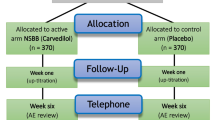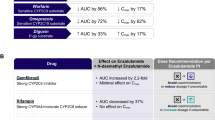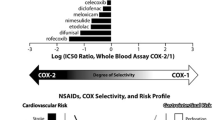Abstract
Obeticholic acid (OcalivaTM) is a farnesoid-X receptor (FXR) agonist that is being developed by Intercept Pharmaceuticals for the treatment of various liver diseases, and has recently been granted accelerated approval in the USA for the treatment of primary biliary cholangitis in combination with ursodeoxycholic acid in adults with an inadequate response to ursodeoxycholic acid, or as monotherapy in adults unable to tolerate ursodeoxycholic acid. The drug is in preregistration for this indication in the EU. This article summarizes the milestones in the development of obeticholic acid leading to this first approval for primary biliary cholangitis.
Similar content being viewed by others
References
Intercept Pharmaceuticals. OCALIVA (obeticholic acid) US Prescribing Information. 2016. http://www.interconnectsupport.com/ocaliva_pi.pdf. Accessed 31 May 2016.
Mudaliar S, Henry RR, Sanyal AJ, et al. Efficacy and safety of the farnesoid X receptor agonist obeticholic acid in patients with type 2 diabetes and nonalcoholic fatty liver disease. Gastroenterology. 2013;145(3):574–82.
Dainippon Sumitomo Pharma Co L, Intercept Pharmaceuticals I. Dainippon Sumitomo Pharma and Intercept Pharmaceuticals announce agreement to develop and commercialize obeticholic acid (INT-747) for chronic liver disease [media release]. 30 Mar 2011. http://www.interceptpharma.com.
Intercept Pharmaceuticals Inc. Intercept Pharmaceuticals submits applications in the U.S. and Europe for marketing approval of obeticholic acid for the treatment of primary biliary cirrhosis [media release]. Jun 29 2015. http://ir.interceptpharma.com/releasedetail.cfm?releaseid=919926.
US Food and Drug Administration. FDA approves Ocaliva for rare, chronic liver disease [media release]. May 31 2016. http://www.fda.gov/NewsEvents/Newsroom/PressAnnouncements/ucm503964.htm.
Neuschwander-Tetri BA, Loomba R, Sanyal AJ, et al. Farnesoid X nuclear receptor ligand obeticholic acid for non-cirrhotic, non-alcoholic steatohepatitis (FLINT): a multicentre, randomised, placebo-controlled trial. Lancet. 2015;385:956–65.
Pellicciari R, Fiorucci S, Camaioni E, et al. 6alpha-ethyl-chenodeoxycholic acid (6-ECDCA), a potent and selective FXR agonist endowed with anticholestatic activity. J Med Chem. 2002;45(17):3569–72.
Albanis E, Alvarez CE, Pruzansky M, et al. INT-747, a novel FXR activator, reverses hepatic fibrosis and cirrhosis in thioacetamide-induced liver injury in rats [abstract no. 1040]. Hepatology. 2005;42(Suppl 1):605–6.
Verbeke LD, Mannaerts I, Schierwagen R, et al. Obeticholic acid, an FXR agonist, reduces hepatic fibrosis in a rat model of toxic cirrhosis [abstract no. P0445]. J Hepatol. 2015;62(Suppl 2):S479.
Nevens F, Andreone P, Mazzella G, et al. An international phase 3 study of the FXR agonist obeticholic acid in PBC patients: effects on markers of cholestasis associated with clinical outcomes and hepatocellular damage [abstract no. 295]. Hepatology. 2014;60(Suppl 4):347A–8A.
Trauner MH, Nevens F, Andreone P, et al. Durable response in the markers of cholestasis through 18 months of open-label long term safety extension study of obeticholic acid in primary biliary cirrhosis [abstract no. Sa1579]. Gastroenterology. 2016;150(4 Suppl 1):S1073–4.
Hirschfield GM, Mason A, Luketic V, et al. Efficacy of obeticholic acid in patients with primary biliary cirrhosis and inadequate response to ursodeoxycholic acid. Gastroenterology. 2015;148(4):751–61.
Kowdley KV, Shah H, Mason A, et al. Long-term safety and efficacy of obeticholic acid treatment in primary biliary cirrhosis after more than 4 years of treatment [abstract no. 628]. Hepatology. 2015;62(Suppl 1):521A–2A.
Walters JR, Johnston IM, Nolan JD, et al. The response of patients with bile acid diarrhoea to the farnesoid X receptor agonist obeticholic acid. Aliment Pharmacol Ther. 2015;41(1):54–64.
Ratziu V, Sanyal AJ, MacConell L, et al. Regenerate: a phase 3, double-blind, randomized, placebo-controlled multicenter study of obeticholic acid therapy for nonalcoholic steatohepatitis [abstract no. THU-488]. J Hepatol. 2016;64(Suppl 2):S294–5.
Author information
Authors and Affiliations
Corresponding author
Ethics declarations
Conflict of interest
The preparation of this review was not supported by any external funding. During the peer review process the manufacturer of the agent under review was offered an opportunity to comment on the article. Changes resulting from any comments received were made by the authors on the basis of scientific completeness and accuracy. A. Markham is a contracted employee of Adis, Springer SBM. Susan J. Keam is a salaried employee of Adis, Springer SBM.
Additional information
This profile has been extracted and modified from the AdisInsight database. AdisInsight tracks drug development worldwide through the entire development process, from discovery, through pre-clinical and clinical studies to market launch and beyond.
Rights and permissions
About this article
Cite this article
Markham, A., Keam, S.J. Obeticholic Acid: First Global Approval. Drugs 76, 1221–1226 (2016). https://doi.org/10.1007/s40265-016-0616-x
Published:
Issue Date:
DOI: https://doi.org/10.1007/s40265-016-0616-x




